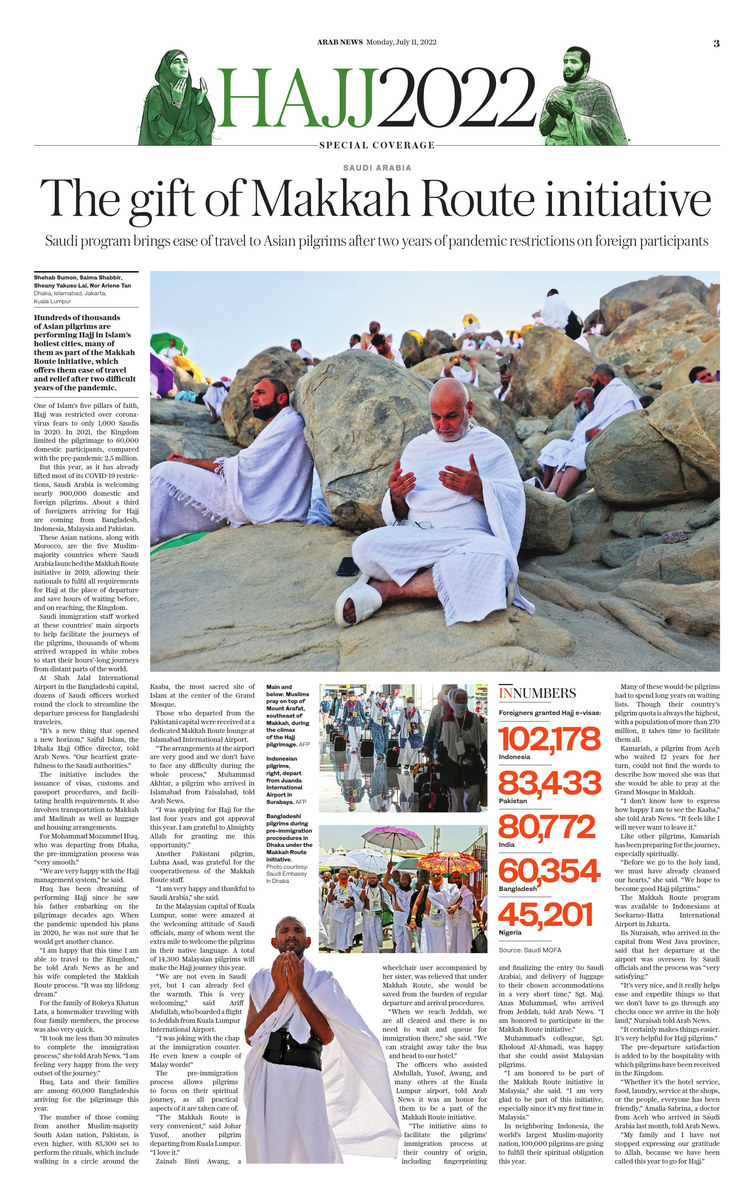DHAKA/ISLAMABAD/JAKARTA/KUALA LUMPUR: Hundreds of thousands of Asian pilgrims are performing Hajj in Islam’s holiest cities, many of them as part of the Makkah Route initiative, which offers them ease of travel and relief after two difficult years of the pandemic.
One of Islam’s five pillars of faith, Hajj was restricted over coronavirus fears to only 1,000 Saudis in 2020. In 2021, the Kingdom limited the pilgrimage to 60,000 domestic participants, compared with the pre-pandemic 2.5 million.
But this year, as it has already lifted most of its COVID-19 restrictions, Saudi Arabia is welcoming nearly 900,000 domestic and foreign pilgrims. About a third of foreigners arriving for Hajj are coming from Bangladesh, Indonesia, Malaysia and Pakistan.
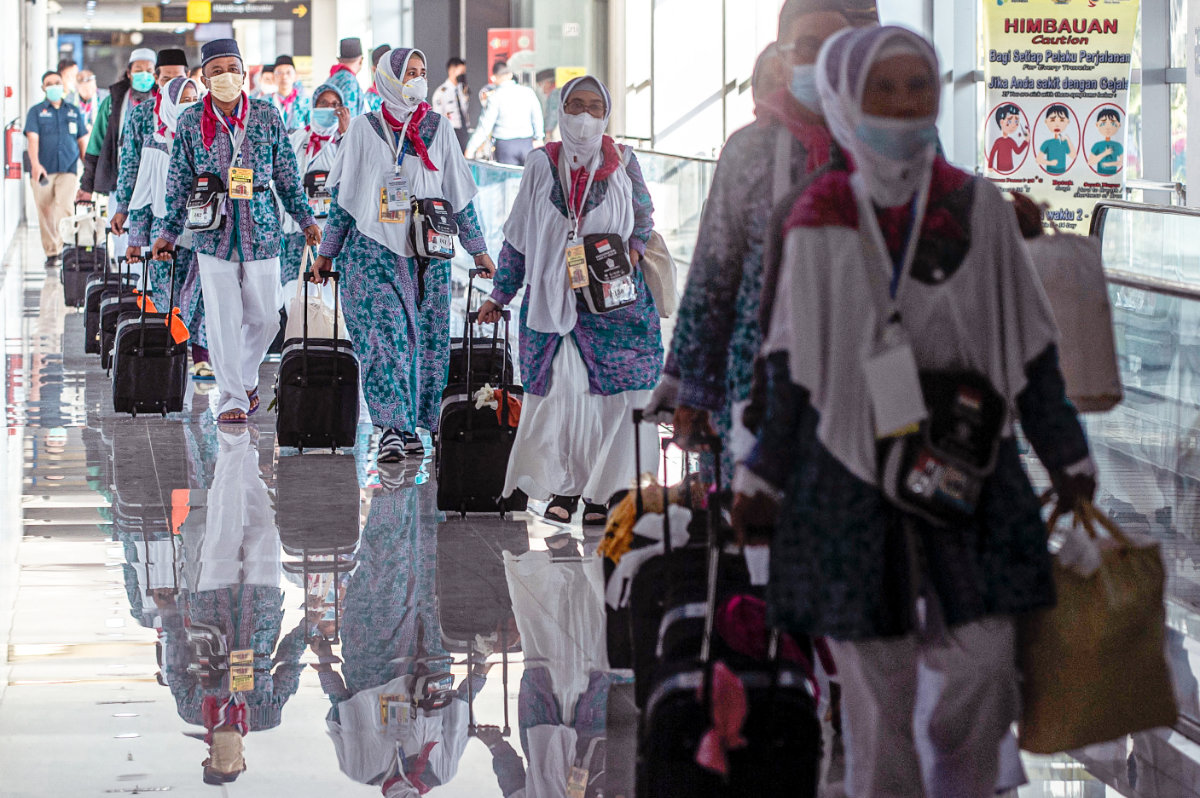
Indonesian pilgrims depart from Juanda International Airport in Surabaya. (AFP)
These Asian nations, along with Morocco, are the five Muslim-majority countries where Saudi Arabia launched the Makkah Route initiative in 2019, allowing their nationals to fulfil all requirements for Hajj at the place of departure and save hours of waiting before, and on reaching, the Kingdom.
Saudi immigration staff worked at these countries’ main airports to help facilitate the journeys of the pilgrims, thousands of whom arrived wrapped in white robes to start their hours’-long journeys from distant parts of the world.
At Shah Jalal International Airport in the Bangladeshi capital, dozens of Saudi officers worked round the clock to streamline the departure process for Bangladeshi travelers.
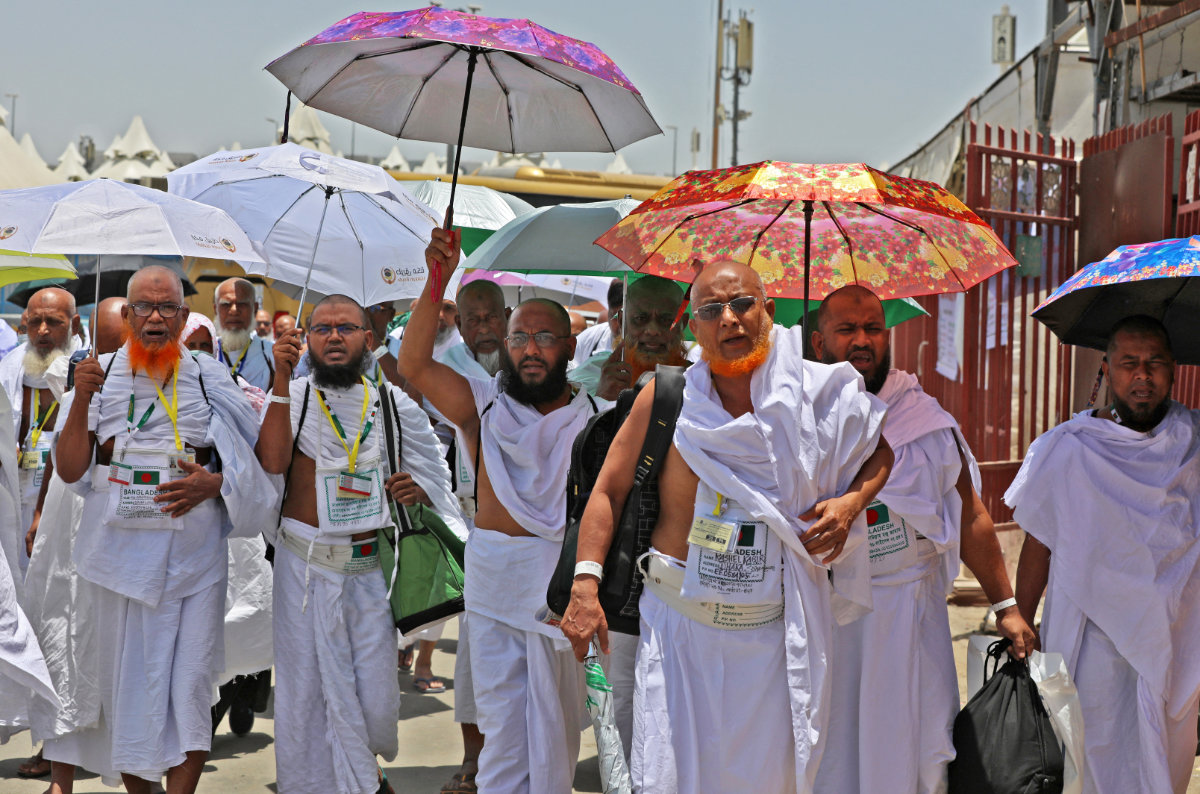
Bangladeshi pilgrims during pre-immigration procedures in Dhaka under the Makkah Route initiative. (Photo courtesy: Saudi Embassy in Dhaka)
“It’s a new thing that opened a new horizon,” Saiful Islam, the Dhaka Hajj Office director, told Arab News. “Our heartiest gratefulness to the Saudi authorities.”
The initiative includes the issuance of visas, customs and passport procedures, and facilitating health requirements. It also involves transportation to Makkah and Madinah as well as luggage and housing arrangements.
For Mohammad Mozammel Huq, who was departing from Dhaka, the pre-immigration process was “very smooth.”
“We are very happy with the Hajj management system,” he said.
Huq has been dreaming of performing Hajj since he saw his father embarking on the pilgrimage decades ago. When the pandemic upended his plans in 2020, he was not sure that he would get another chance.
“I am happy that this time I am able to travel to the Kingdom,” he told Arab News as he and his wife completed the Makkah Route process. “It was my lifelong dream.”
For the family of Rokeya Khatun Lata, a homemaker traveling with four family members, the process was also very quick.

Rokeya Khatun Lata, a Bangladeshi pilgrim, speaks to Arab News at Shah Jalal International Airport in Dhaka, on June 26, 2022. (AN Photo)
“It took me less than 30 minutes to complete the immigration process,” she told Arab News. “I am feeling very happy from the very outset of the journey.”
Huq, Lata and their families are among 60,000 Bangladeshis arriving for the pilgrimage this year.
The number of those coming from another Muslim-majority South Asian nation, Pakistan, is even higher, with 83,300 set to perform the rituals, which include walking in a circle around the Kaaba, the most sacred site of Islam at the center of the Grand Mosque.
INNUMBERS
Foreigners granted Hajj e-visas:
102,178 Indonesia
83,433 Pakistan
80,772 India
60,354 Bangladesh
45,201 Nigeria
45,086 Turkey
39,635 Iran
22,189 Egypt
18,970 Algeria
Source: Saudi MoFA
Those who departed from the Pakistani capital were received at a dedicated Makkah Route lounge at Islamabad International Airport.
“The arrangements at the airport are very good and we don’t have to face any difficulty during the whole process,” Muhammad Akhtar, a pilgrim who arrived in Islamabad from Faisalabad, told Arab News.
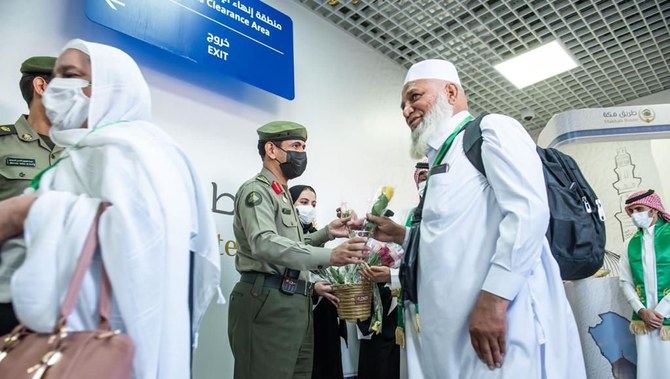
The first batch of Hajj 2022 pilgrims from Pakistan arrive in Madinah, Saudi Arabia, on June 8, 2022, through a dedicated “Makkah Route” lounge at Islamabad airport. (Supplied)
“I was applying for Hajj for the last four years and got approval this year. I am grateful to Almighty Allah for granting me this opportunity.”
Another Pakistani pilgrim, Lubna Asad, was grateful for the cooperativeness of the Makkah Route staff.
“I am very happy and thankful to Saudi Arabia,” she said.<
In the Malaysian capital of Kuala Lumpur, some were amazed at the welcoming attitude of Saudi officials, many of whom went the extra mile to welcome the pilgrims in their native language. A total of 14,300 Malaysian pilgrims will make the Hajj journey this year.
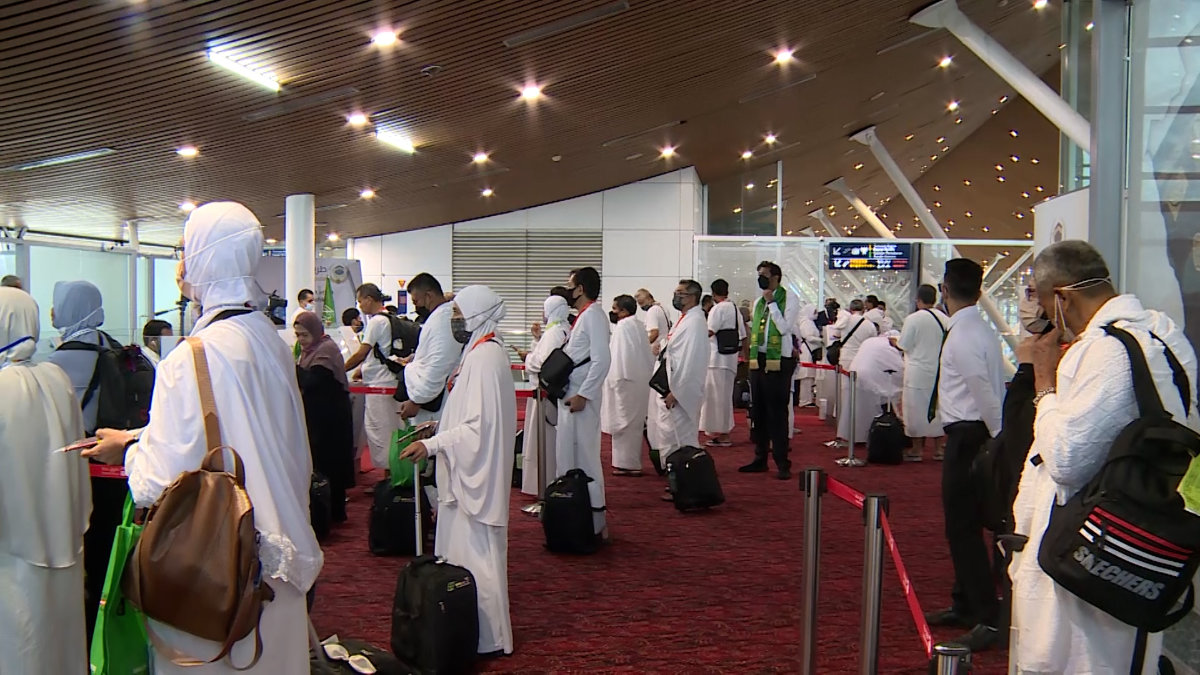
Malaysian Hajj pilgrims go through pre-immigration procedures under the Makkah Route initiative at Kuala Lumpur International Airport, June 28, 2022. (AN Photo)
“We are not even in Saudi yet, but I can already feel the warmth. This is very welcoming,” said Ariff Abdullah, who boarded a flight to Jeddah from Kuala Lumpur International Airport.
“I was joking with the chap at the immigration counter. He even knew a couple of Malay words!”
The pre-immigration process allows pilgrims to focus on their spiritual journey, as all practical aspects of it are taken care of.
“The Makkah Route is very convenient,” said Johar Yusof, another pilgrim departing from Kuala Lumpur. “I love it.”
Zainab Binti Awang, a wheelchair user accompanied by her sister, was relieved that under Makkah Route, she would be saved from the burden of regular departure and arrival procedures.

Malaysian Hajj pilgrims go through pre-immigration procedures under the Makkah Route initiative at Kuala Lumpur International Airport, June 28, 2022. (AN Photo)
“When we reach Jeddah, we are all cleared and there is no need to wait and queue for immigration there,” she said. “We can straight away take the bus and head to our hotel.”
The officers who assisted Abdullah, Yusof, Awang, and many others at the Kuala Lumpur airport, told Arab News it was an honor for them to be a part of the Makkah Route initiative.
“The initiative aims to facilitate the pilgrims’ immigration process at their country of origin, including fingerprinting and finalizing the entry (to Saudi Arabia), and delivery of luggage to their chosen accommodations in a very short time,” Sgt. Maj. Anas Muhammad, who arrived from Jeddah, told Arab News. “I am honored to participate in the Makkah Route initiative.”
Muhammad’s colleague, Sgt. Kholoud Al-Ahmadi, was happy that she could assist Malaysian pilgrims.
“I am honored to be part of the Makkah Route initiative in Malaysia,” she said. “I am very glad to be part of this initiative, especially since it’s my first time in Malaysia.”
In neighboring Indonesia, the world’s largest Muslim-majority nation, 100,000 pilgrims are going to fulfill their spiritual obligation this year.

Indonesian pilgrims pray upon arrival in King Abdulaziz International Airport in Jeddah, Saudi Arabia, June 2022. (Photo courtesy: Indonesia's Ministry of Religious Affairs)
Many of these would-be pilgrims had to spend long years on waiting lists. Though their country’s pilgrim quota is always the highest, with a population of more than 270 million, it takes time to facilitate them all.
Kamariah, a pilgrim from Aceh who waited 12 years for her turn, could not find the words to describe how moved she was that she would be able to pray at the Grand Mosque in Makkah.
“I don’t know how to express how happy I am to see the Kaaba,” she told Arab News. “It feels like I will never want to leave it.”
Like other pilgrims, Kamariah has been preparing for the journey, especially spiritually.
“Before we go to the holy land, we must have already cleansed our hearts,” she said. “We hope to become good Hajj pilgrims.”
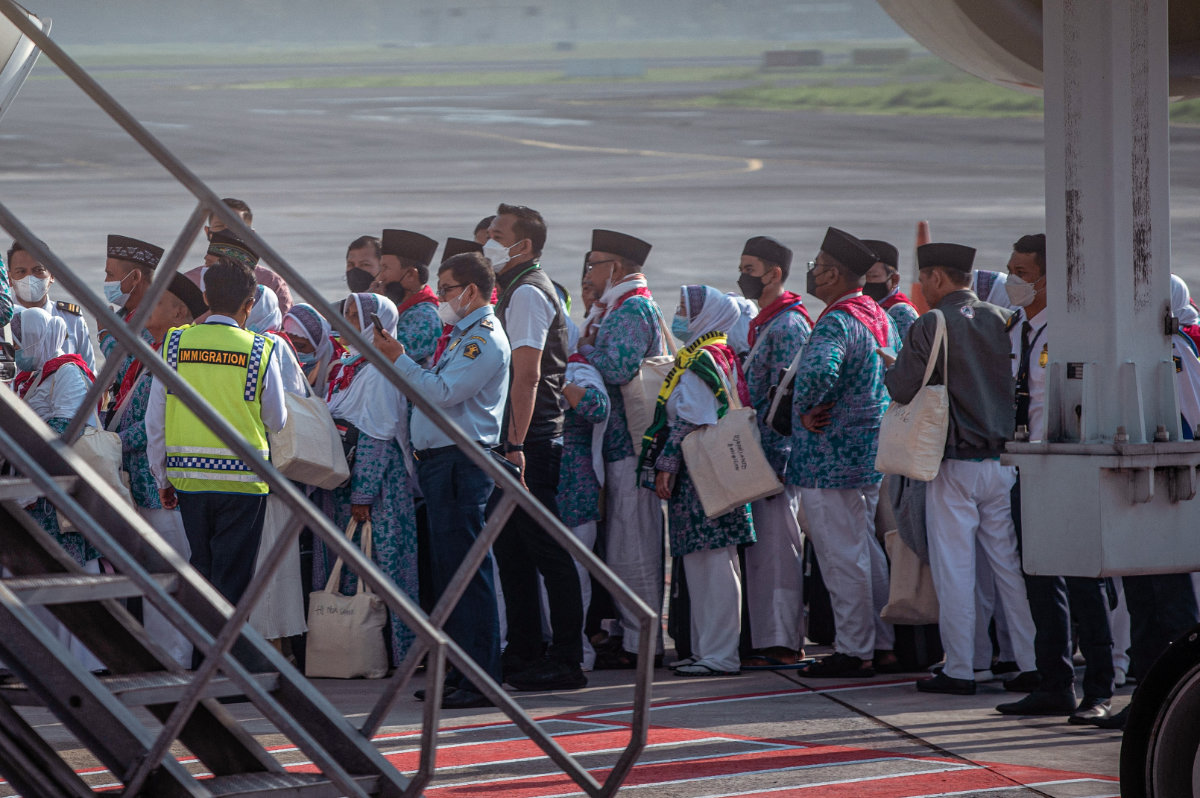
Indonesian pilgrims prepare to depart from Juanda International Airport in Surabaya on June 4, 2022. (Juni Kriswanto / AFP)
The Makkah Route program was available to Indonesians at Soekarno–Hatta International Airport in Jakarta.
Iis Nuraisah, who arrived in the capital from West Java province, said that her departure at the airport was overseen by Saudi officials and the process was “very satisfying.”
“It’s very nice, and it really helps ease and expedite things so that we don’t have to go through any checks once we arrive in the holy land,” Nuraisah told Arab News.
“It certainly makes things easier. It’s very helpful for Hajj pilgrims.”

Malaysian pilgrim Ariff Abdullah speaks to Arab News at Kuala Lumpur International Airport on June 28, 2022. (AN Photo)
The pre-departure satisfaction is added to by the hospitality with which pilgrims have been received in the Kingdom.
“Whether it’s the hotel service, food, laundry, service at the shops, or the people, everyone has been friendly,” Amalia Sabrina, a doctor from of Aceh who arrived in Saudi Arabia last month, told Arab News.
“My family and I have not stopped expressing our gratitude to Allah, because we have been called this year to go for Hajj.”
